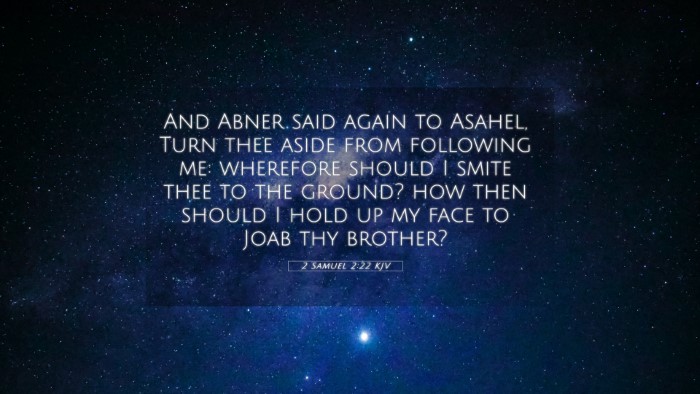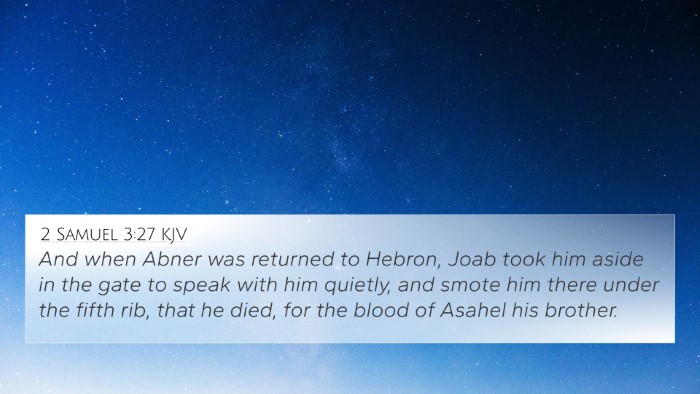Understanding 2 Samuel 2:22
2 Samuel 2:22 states: "And Abner said again to Joab, 'Turn aside from following me. Why should I strike you down?'" This verse is pivotal in the narrative surrounding the conflict between the factions of David and Saul, highlighting themes of rivalry and the pursuit of peace amidst conflict.
Summary of the Verse Meaning
This verse occurs shortly after a sequence of events that establishes the tension between Abner, who supports the house of Saul, and Joab, the commander of David's forces. Abner's words reflect a moment of potential reconciliation, as he urges Joab to cease his aggressive pursuit. This suggests a deeper layer of understanding about conflict resolution, leadership, and the impact of personal choices during periods of strife.
Commentary Insights
-
Matthew Henry's Commentary:
Henry emphasizes the importance of Abner's warning. He interprets it as a moment when reason should prevail over rage, urging that conflicts can be resolved through wise counsel instead of warfare. The verse illustrates Abner's awareness of the futility of further bloodshed, as he seeks to persuade Joab to reconsider the violent course they are on.
-
Albert Barnes' Notes:
Barnes highlights the significance of Abner's authority and respect in the situation. He points out that Abner's appeal to Joab is not just for his own safety but indicates a desire to maintain a degree of honor and respect among rivals. It serves as a reflection of his position as a leader and tactician, aiming to salvage relationships while advocating for a more strategic approach to their conflict.
-
Adam Clarke's Commentary:
Clarke further analyzes the implications of the exchange. He notes that Abner's call to Joab embodies a voice of reason amidst the tumultuous backdrop of civil war. Clarke raises questions about loyalty, peace, and the cost of revenge, emphasizing the narrative as a lesson in understanding the moral weight of conflict decisions.
Cross-References Related to 2 Samuel 2:22
- Proverbs 15:1: "A soft answer turns away wrath, but a harsh word stirs up anger." This teaches the power of peaceful dialogue.
- James 1:19: "Let every person be quick to hear, slow to speak, slow to anger." Highlights the importance of listening and calmness in conflict situations.
- Matthew 5:9: "Blessed are the peacemakers, for they shall be called sons of God." Emphasizes the value of peace over strife.
- Romans 12:18: "If possible, so far as it depends on you, live peaceably with all." Encourages striving for peace in relationships.
- Proverbs 20:3: "It is an honor for a man to keep aloof from strife, but every fool will be quarreling." Urges the avoidance of unnecessary conflicts.
- 2 Timothy 2:24: "And the Lord's servant must not be quarrelsome but kind to everyone." Promotes kindness in all interactions.
- Philippians 4:5: "Let your reasonableness be known to everyone. The Lord is at hand." Encourages calmness and rationality in behavior towards others.
- 1 Peter 3:11: "Let him turn away from evil and do good; let him seek peace and pursue it." Encourages actively pursuing peace.
Thematic Bible Verse Connections
The events surrounding 2 Samuel 2:22 provide insight into broader biblical themes of conflict, leadership, and reconciliation. Many biblical figures faced similar dilemmas, which can be seen in the following:
-
Moses and Aaron (Exodus 32:11-14): Intercession for peace during times of anger against the Israelites.
-
David's own life (1 Samuel 24:6): Acknowledging the value of refraining from harm, even when entitled to it.
-
Jesus’ sermons (Matthew 5-7): Stressing the importance of peace and mercy in interpersonal relationships.
Conclusion
2 Samuel 2:22 serves as a significant lesson in the importance of dialogue, peace, and the arduous journey of leadership during times of conflict. Through better understanding the dynamics between Joab and Abner, we glean valuable insights for personal conduct, both in scriptural interpretation and practical life. The emphasis on peacemaking resonates with numerous biblical teachings, allowing us to link and cross-reference this scripture with others that address similar themes.






